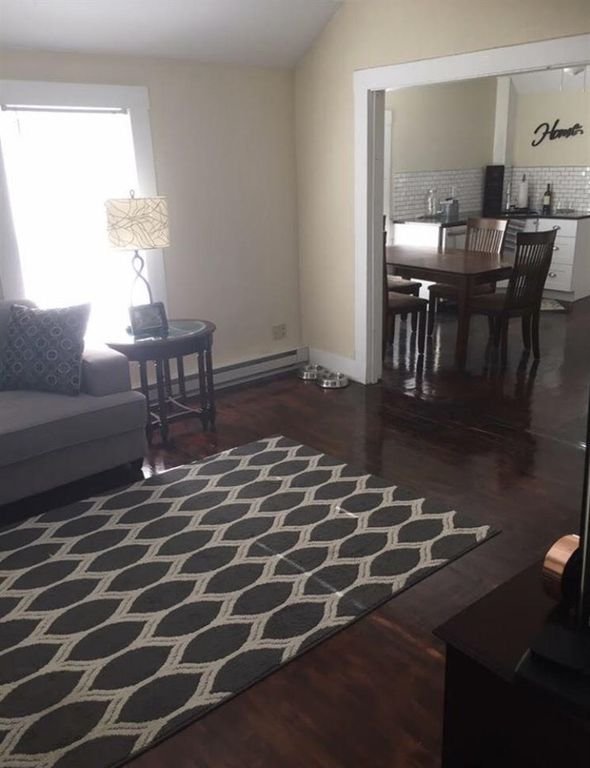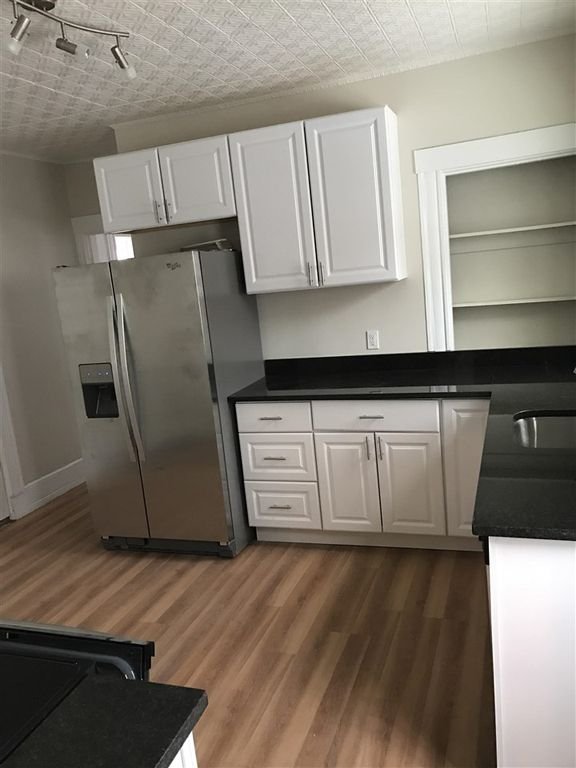
Before I get into this, I just want you all to know that I'm no one special. I'm a college dropout and full-time waitress from a lower middle-class background. I have student loan debt and an average credit score. I live in the north eastern United States where housing is not at all cheap unless you live in the boonies. The point is, if I can do this then so can you.
Two years ago, my fiance and I said goodbye to our overpriced apartment. It was a remodeled two-bedroom unit in an above average apartment community where my fiance worked as a maintenance technician. Even with my fiance's employee discount on rent, it was still very expensive to live in our apartment. But we liked the place and we could still afford it (barely) so we stayed. That is, until we were served a double whammy: not only was rent going to increase by $200/month, but the employee discount was also going to end! We soon realized we would be spending over HALF of our pre-tax income on rent alone. Something had to change, quickly.
In August 2015, we moved into my fiance's parents' basement. I was less than thrilled at this turn of events. But I can now say that it was the best financial move we could have possibly made. We had a rough plan- first, save a ton of money and second, buy a multi-family house where we would live in one unit while renting the other(s) out. His parents' generosity allowed us to ramp up our savings to an incredible amount. We managed to save $25,000 between the end of 2015 to 2016- roughly 39% of our combined incomes.
Now, you're probably thinking, that's all well and good but what if you don't have a fiance with well-off parents? Okay, that's a fair point. But look- even if you don't have that support network and you still have to pay rent while trying to save, you can still save some percentage of your money. Even if you can only save $1 today, that's still better than spending that $1. Realistically though, you should be saving more than $1/day if you're serious about purchasing an investment property. It may take you longer than us but if you set a specific goal and break it down into manageable increments (like a savings quota you force yourself to meet every month, week, or day) you may discover that it's actually pretty straight forward (though not to be confused with easy) to achieve a set goal.
Even without rent payments, our year of intense saving wasn't exactly a walk in the park. We both had auto loans on our cars, student loan debt, insurance payments, veterinary/recurring expenses for our two dogs, and day-to-day expenses. In reality, we were living on about 30% of our combined incomes. We managed to do this through pure discipline, made a little easier by the desire to not live in a basement.
Once we had about $15K racked up, our next step was to get pre-qualified by a mortgage lender. Pre-qualification didn't necessarily mean we were guaranteed a loan, but it did mean that were good enough candidates (based on our income and basic background checks) that the lender was willing to take a risk on us and give us a quote. Note: If you know you're going to need financing for a property purchase, it's useless to begin searching for properties until you get pre-quaIified. Most sellers won't even consider offers from non-qualified buyers.
After pre-qualification, I felt comfortable enough to take the next (and most fun) step: house hunting! I began searching for properties in late summer of 2016 with a strict criteria. We weren't searching for a forever home but rather, a solid investment. I searched for properties with at least 2 but not more than 4 units (to take advantage of owner-occupied legal status), within towns with below-average to average property taxes, located in Class B i.e. "blue collar" neighborhoods, and that needed cosmetic but not structural repair.
The market was heating up at this time and every property that I pitched to our real estate agent seemed to be gobbled up by all-cash investors in matters of days. We just couldn't compete at the time. But we persisted and finally struck gold! A week before Christmas 2016, our agent called me up frantically about a house we had to see right away.
It was a 117 year old duplex with original hardwood floors, sprawling units with gigantic master bedrooms, new plumbing, a new tankless water heater, and remodeled bathrooms and kitchens. The minute I saw it, I loved it. It was in a solid Class B neighborhood, generated $1,350 in rental income from a single unit, and fit the rest of our criteria. We made an offer that very first day.

By then, the market had slowed. After all, most people don't plan on buying a house in the dead of a New England winter. The seller was clearly desperate for a quick sale and after some back and forth, we negotiated the price down by $20K- for a grand total of $245,000.

With the purchase and sales agreement signed, the real work began. Everything that came before this point now seemed easy. I didn't realize this, but the most difficult and tiring part of buying a property is simply getting approved for the mortgage. We were already pre-qualified but this essentially means nothing in the eyes of lenders and is no guarantee of a loan (pre-qualification is mostly used to be taken seriously by sellers more than lenders).
In total, my fiance and I submitted 81 different personal documents to our lender. These included bank statements going back a year, tax documents, written statements, and many many more. We each had to take online classes on Becoming a Homeowner and Becoming a Landlord. During this time, we also had to have our prospective purchase inspected and appraised, negotiate with the seller to get the siding repaired, purchase and acquire proof of homeowners insurance, and of course submit our payments. These payments included a down payment of $5,000 to prove our seriousness, closing payments, and escrow payments. These payments totaled about $22,000.
After surviving the wringer, we finally had our closing date! Everything had to line up just right but we finally signed the papers at our agent's office on February 1st of this year and became the proud new owners of not just a house but a source of income and an investment.
It's now December 2017 and we've been living in our house for almost a year. We have a great tenant whose rental payment takes care of most of our mortgage payments. We pay a little over $500/month (that includes escrow payments that take care of our homeowners insurance, mortgage insurance, and property taxes) to live in our own house compared to $1,400/month renting an apartment owned by someone else. That's a total of over $10,530 saved in just one year of housing expenses! Of course, it's not all fun and games being a landlord. We had a less than stellar experience with our first tenants (involving drug dealing, late payments made in quarters, and so much more) but that's a story for a different day. I still think it has all been worth the headache though, to live in my own home for cheaper than any rental in my area
I had a lot of help along the way and I recognize how lucky I am to have such a great partner and generous family. But the most important catalyst that propelled me from that dank, dark basement into the lovely home I have now was hard work. I picked up more shifts at my job, held my nose to the grindstone and earned a promotion. There is no get rich quick angle to this method of real estate investing. You must work hard and you must save diligently. But if you're willing to put in the work, you'll most certainly reap the rewards.
We plan on purchasing our second property within the next year. I'm very excited for this one-it'll be profitable (that's the plan, at least)!
This is my first post on Steemit, thank you for reading!
Great story! Just makes for exciting times head.
Downvoting a post can decrease pending rewards and make it less visible. Common reasons:
Submit
Thank you! This first investment has also opened my eyes to other forms of investments, it's an exciting world out there.
Downvoting a post can decrease pending rewards and make it less visible. Common reasons:
Submit
This is very well written. Great content!
Downvoting a post can decrease pending rewards and make it less visible. Common reasons:
Submit
Thank you- I plan on writing more!
Downvoting a post can decrease pending rewards and make it less visible. Common reasons:
Submit